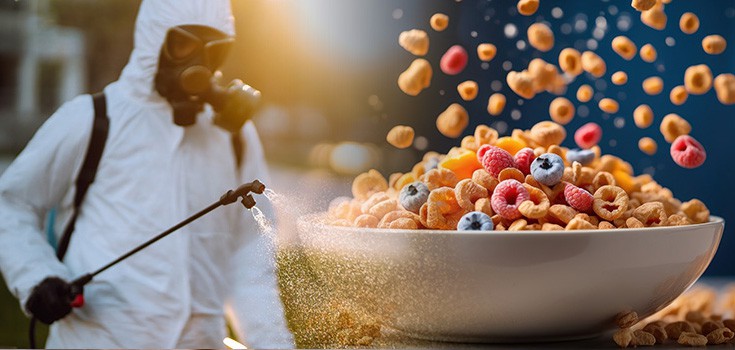80% of Americans Exposed to Fertility-Ruining Pesticides in Oat-Based Foods

A concerning discovery has been made by researchers regarding the presence of a chemical pesticide, chlormequat, in oat-based foods available in the U.S. market, which could potentially affect human health.
Dr. Patrick Hannon, an assistant professor in the Department of Obstetrics & Gynecology at the University of Kentucky, highlighted the potential link between chlormequat exposure and fertility issues, emphasizing the importance of being mindful of what we consume.
Chlormequat, which is prohibited by the Environmental Protection Agency (EPA) for use on food crops such as oats, wheat, and barley within the U.S., is designed to inhibit stem growth, resulting in a sturdier stalk that benefits production and yield.
Despite this, its use is permitted in imported goods from countries like Canada and the United Kingdom, with regulated limits on its concentration. However, in 2020, the EPA raised these limits.
80% of Americans Have Detectable Levels of Chlormequat
- Widespread Chemical Exposure: An Environmental Working Group peer-reviewed study found that 80% of Americans have detectable levels of chlormequat, a chemical used in agriculture to enhance crop growth, in their systems.
- Increasing Detection Rates: The Environmental Working Group (EWG) has observed an increase in the detection rates of chlormequat in recent years, with 90% of samples testing positive in 2023, up from 69% in 2017. This suggests that exposure to chlormequat among the general population is rising.
- Prevalence in Non-Organic Foods: Testing revealed that 92% of non-organic oat-based foods contained detectable levels of chlormequat, whereas only a small fraction of organic and wheat-based products showed low levels of the chemical.
Chlormequat and Fertility Issues
Alarmingly, studies conducted on female pigs exposed to chlormequat revealed significant disruptions in reproductive cycles, hormone production, and fertility.
Further research indicated potential impacts on embryonic development, suggesting possible implications for human health, particularly in women. Male mice studies also showed reproductive effects.
Oats Contaminated with Pesticides is Nothing New
The issue of pesticide-riddled oats is not new. A report published in 2018 showed how some oat products, including oat cereals, oatmeals, and granola and snack bars, contained unsafe levels of glyphosate – a chemical in the controversial weedkiller Roundup.
In 2016, Grain Millers, Inc. announced that it would avoid buying western Canadian oats that have been treated with the herbicide.
The Solution for Consumers
Dr. Hannon suggests that opting for organic oat-based products might be a safer choice, as these typically involve fewer pesticides and those used are derived from natural sources.
He notes that the research on chlormequat’s effects is still in its early stages, but ongoing investigations are expected to provide deeper insights into its toxicological impacts.
